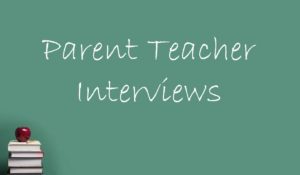Parent-Teacher Conference Questions

Specific Parent-Teacher Conference Questions
The “you” in these questions refers to the teacher. The “you” in the explanation below the question refers to you as the parent.
1. “Can you explain the breakdown of my child’s current assessment?”
-You will want to ensure that you are being honest about where your child is at in their home life as well. This helps the teacher see your child as a whole, rather than just someone they are assessing.
2. “What do you see are my child’s weaknesses and strengths?”
-Having the growth mindset, you will want to see weaknesses as correctable and strengths as the effects of hard work.
3. “Can you please show me the assessment criteria you used to mark my child’s work?”
– This is important as it lets you know what the teacher was looking for when assessing your child.
4. “Was my child aware of this criteria prior to completing the work?”
-If not, you will want this to change. Your child must be aware of what they are getting marked on prior to handing in their work. Otherwise, it’s like telling a child you are going to rate how well they ride their bike but you haven’t told them that you expect them to jump two curbs and pop a wheely!
5. “How many pieces of work were assessed?”
-Your child might have received a certain grading on one assignment and that defined their whole assessment. Then you will have to decide if it’s really worth stressing over as one test or whatever the assesssment tool was, is not an accurate representation of your child’s abilities.
6. “Can you please show me the work that was assessed and the assessment sheet that assigned my child their mark?”
-This will let you know what was actually included in determining the mark, as well as see where your child is falling short.
7. “Did my child have an opportunity to practice the skill before being marked on it? If so, can you please show me their work from inception to completion?”
-This will let you see the process the teacher worked through with your child to learn the skill being assessed, as well as your child’s progress on the journey.
8. “Did my child have an opportunity to re-hand in any of the work or can they still re-hand in work?”
-Now that you and your child know what the expectations are, determine how they could improve.
9. “Can you please show me what the highest level assignment looks like for the assignments that my child did not do well on?”
-This will give you an idea of that specific teacher’s expectations.
10. “Can I please have any upcoming assessment criteria and assignment due dates and topics?”
-This information will be needed so you can fully support your child in any assessment pieces, moving forward.
11. “Can you please provide me with the upcoming schedule of all student work: topics, assignments, tests?”
-You will be able to help your child prepare more effectively.
12. “Can you set up a dialogue between my child and yourself, where they show their piece that will be assessed and have you determine what grade level it is currently?”
-This gives your child responsibility in the process and allows them to make a conscious choice to improve and understand how to do so.
13. a) “Will you provide any sort of review for the final exam (if there is one)?”
-Getting a review for the final exam ensures that your child is aware of what is on it. When your child does the review, they will see if they understand the material. Remember to have your child put the dates for final exams in their agenda and then work backwards from that date to put in when they should study, when they should have the review completed by, and when they should schedule time for asking the teacher any questions they don’t understand.
b) “If so, can my child have the review earlier?”
-It’s important to get the review as soon as the teacher is able to provide it as that gives your child more time to manage all the tasks that go into writing an exam.
c) “If not, what could you suggest my child do to prepare?”
-When a teacher doesn’t provide a review, this makes it heard on the student to know what the important pieces are that they have covered.
14. “What would be the best course of action right now to catch up, keep up, and/or excel?”
-The teacher ultimately decides on the grade your child is going to get, as well as the path it will take them to get there; so, it’s best to make an action plan for success with them.
15. “How is it best to communicate with you moving forward?”
-Agenda, email, phone call, and/or in person meetings could be some of the suggestions.
16. “Are you willing to communicate with a tutor?”
-If so, ask them what the best method of communication would be.

Trackback from your site.
Recent Comments
-

Amber Scotchburn
I would love to keep sharing information with you!
Please let me know what else you would like to hear about,
Amber -

Amber Scotchburn
Thank you :)!
Where did you share this?
Amber -

Amber Scotchburn
Thanks :)!
I’d love you to put the link to the results that you found about the Mid East, perhaps I can put it in a future podcast.
Amber -
Google
Google
Wonderful story, reckoned we could combine a handful of unrelated data, nevertheless definitely worth taking a search, whoa did 1 find out about Mid East has got additional problerms too.
-
Google
Google
Here is a good Blog You may Locate Interesting that we encourage you to visit.


